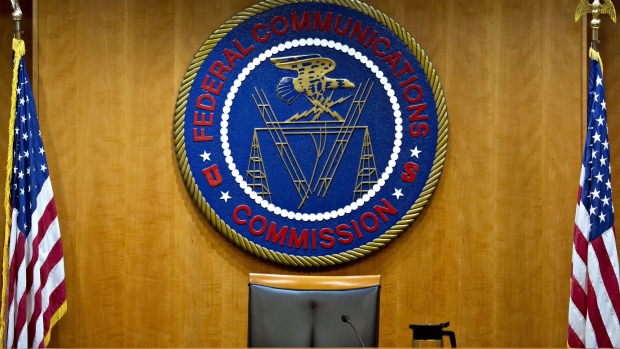Sep 23, 2021
FCC May Be Hamstrung Under GOP Majority as Nominations Lag
, Bloomberg News

(Bloomberg) -- Republicans are poised to become a majority of the Federal Communications Commission at year’s end unless President Joe Biden nominates a chair who can swiftly be approved by the Senate.
Eight months into his administration, Biden hasn’t named anyone to permanently lead the agency. Acting Chairwoman Jessica Rosenworcel is set to leave at year’s end because her term has expired, and it’s unclear lawmakers will have time to take up nominations during a waning session dominated by high-stakes bills and a looming debt ceiling.
The odd dynamic could see the FCC’s lone remaining Democrat, Geoffrey Starks, serve as acting chairman of a five-member commission with two vacancies. He would control the agenda. But he would need support from at least one of the FCC’s two Republicans for major initiatives that require a vote.
Movement could stall on Democratic goals such as restoring net neutrality rules that bar cable and phone providers from interfering with subscribers’ web traffic but were gutted by Republicans under former President Donald Trump. Efforts to bolster broadband subsidies, making mobile broadband networks more reliable, and halting consolidation of broadcast ownership, could also be delayed.
“It’s just horribly frustrating to me that we can’t make progress on anything the Republicans don’t support,” David Choffnes, executive director of Northeastern University’s Cybersecurity and Privacy Institute, said in an interview. “Every day we don’t have a commission that gets us a majority, it’s a day we don’t have to restore the net neutrality rules.”
Biden named Rosenworcel to lead the FCC shortly after he took office. The FCC has been short one commissioner since January when Trump’s Chairman Ajit Pai, a Republican, left. Now the agency is split along party lines with its membership comprised of two Republicans, Rosenworcel and Starks.
Rosenworcel is serving a holdover period after her term expired last year, and she would need to leave the agency when Congress ends its session unless nominated by the White House to a fresh term and then confirmed by the Senate.
Despite months of speculation, no names have emerged from the White House for the seat held by Rosenworcel, and that vacated by Pai.
Rosenworcel has long been considered a leading contender. On Wednesday, 24 Democratic senators, and an independent who caucuses with them, called on Biden to select her, saying in a letter “there is no better qualified or more competent person” and that the decision to nominate her “can no longer be delayed.”
“It will take months for a different nominee to move through the process, hire staff and begin implementing an agenda, leading to indecision and gridlock,” the senators said in the letter. Rosenworcel will face few obstacles to confirmation since the Senate has approved her before, the lawmakers said.
The White House and the FCC declined to comment on nominees.
“The odds are better than even the 1-2 situation occurs,” said Blair Levin, a Washington-based analyst for New Street Research. “To avoid that situation the Biden administration would have to nominate and confirm two nominees by the end of the year, which is difficult.”
The remaining Senate calendar is crowded, and a single senator can slow a nominee, Levin said.
A short-handed FCC will be able to do “very little beyond the necessary administrative things, and things that are non-controversial,” Andrew Jay Schwartzman, senior counselor at the Benton Institute for Broadband & Society, said in an interview.
Progress is needed on matters such as boosting competition for apartment dwellers’ internet access and restoring the net neutrality rules, Schwartzman said.
“We may be 14, 16, 18 months into the administration with no action on initiatives the progressives want,” Schwartzman said. “The sand will start running out of the hourglass if they don’t get this fixed.”
©2021 Bloomberg L.P.





